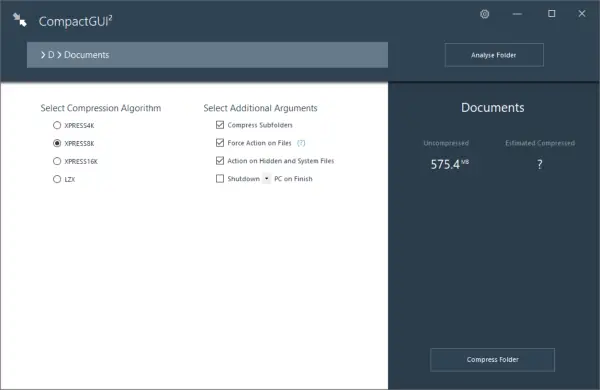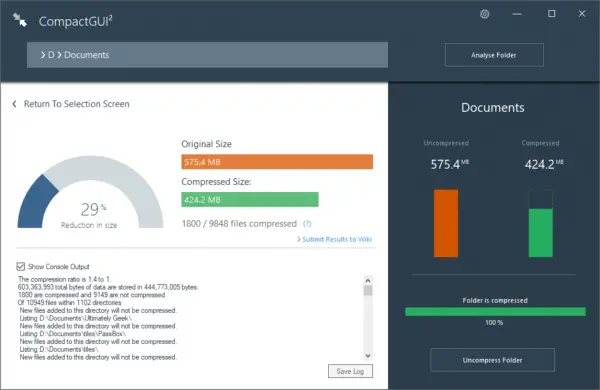Are you always running out of space on your hard drive? The average number of programs installed on a computer that is used daily has increased over the years. This creates a need for more space and leaves behind less space for your other files. Compression is one thing that can help you put a few more files on the same disk. The compression we are talking about is not the regular compression which involves compressing files to a ZIP or RAR file. Rather, we are talking about compression at the file system level.
Windows 11/10 comes with an inbuilt tool called compact.exe. The main task of this tool is to compress files and folders using NTFS compression. As mentioned, it will not generate a separate ZIP or RAR file; instead, compression algorithms will be used at the file system level. This will result in more free space, and your programs and applications will still be usable. Compact can be accessed from the command line or from the properties of a folder. Most users cannot take advantage of this feature just because it is hard to reach. In the post, we’ll talk about a free tool called CompactGUI which makes it a lot easier to use compact.exe.
Compress installed Programs with CompactGUI

You can consider CompactGUI as an intermediate between you and Windows’s compact.exe. The GUI makes it very simple to compress your files. The tool displays all the stats and also lets you choose the compression algorithm. We have discussed a few more arguments in this post.
To get started, choose a folder that you want to compress. It can be anything, a game or an installed application or any other folder. Once you’ve selected a folder, you can view the stats in the left panel. Or you can hit the ‘Analyse Folder button to view the current compression status. The program will display the current size and the estimated compressed size. You can get a fair idea of how much space you are going to save.
Now it is time to choose a compression algorithm. Basically, there are four compression algorithms available and they are:
- XPRESS4K: This one is the fastest, but the compression is weakest.
- XPRESS8K: An intermediate combination of speed and strength.
- XPRESS16K: Stronger but slower.
- LZX: Strongest and slowest, should be used only on machines with good processing power.
By default, compact.exe runs the XPRESS8K algorithm and it is the most recommended one as well.
CompactGUI supports a few additional arguments. You can enable/disable compression for subfolders or force action on files. Moreover, you can also include hidden and system files in the compression. This last option allows you to shutdown/restart/sleep your computer after the compression has finished. Now, you are all ready to start the compression process.
The tool has capabilities to run in the background and you can even minimize it to system tray. It will automatically notify you when the compression is complete. Moreover, you can add a shortcut to CompactGUI in the right-click menu of a folder.

Once the compression is complete, you can view all the stats and details about the compressed folder. You can compare the sizes before and after the compression and see the percentage reduction in size. The tool’s decompression option allows you to easily decompress the folders back to their original state.
CompactGUI is a great GUI for the inbuilt compact.exe. Now you can easily compress folders and save some disk space. And the best part is the files and subfolders will still be accessible even after compression. The tool is a time saver and a space saver as well. Visit github.com to download CompactGUI.
I wonder how this would impact the lifespan of a SSD? Presumably this leads to a lot more reads/writes.
I am using it on Windows Insider 17093 and it doesn’t seem to work !!! Can you help me with this ?
The tool is a time saver and a space saver as well.
Please explain the Time saver part??
And like Whatabug, I would like to know impact on SSD.
BTW I have a 110Gb SSD and use around 25-30Gb for system and programs. I have a 2Tb HDD using an HDDCaddy and all user files are written there. During my Insider period I made 2 partitions of 55Gb and never had space issues. I admit I dont play games, which are notable for requiering lots of space.
Use Feedback Hub to report, it might be an issue.
I have the same question/concern as @whatabug:disqus.
I’m assuming that the OS (Creators Update) should already know the
difference between SSDs and mechanical HDDs, and whether or not to run
compact.exe on either.
If it’s a program, game or folder that doesn’t get updated, it adds at most 1x the folder’s worth of writes to the SSD. I released a new version yesterday as well that skips over poorly compressed files so that writes are minimised further. Reading data from an SSD has no effect on lifespan.
With that in mind, this program will not have a significant impact on your SSD lifespan anyway. The issues with lifespan that plagued earlier SSDs are negligible nowadays, however old beliefs die hard. Many consumer drives nowadays are rated for over 20GB of daily writes for over 10 years, and even those are conservative estimates. If you’re a normal user, you will almost certainly upgrade your computer
several times over before your SSD starts to fail because of excessive
writes, and by that point you won’t be using the drive anyway.
Thanks for that explanation. And thanks for a great program!
Duplicate Files Deleter Program is superb to find and delete duplicate files from your computer. It searches throughout your computer, create a list of duplicate files and present them before you for deciding what you want to do with these files. A great way to free space of your disks. If you will try you will love it.